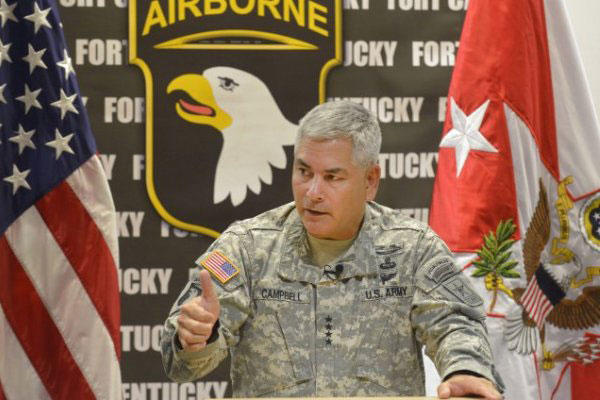The lead U.S. commander in Afghanistan said the growing threat of ISIS could delay the withdrawal of U.S. troops from Afghanistan.
Joint Chiefs of Staff Chairman Gen. Martin Dempsey and Army Gen. John Campbell met Sunday in Kabul with President Ashraf Ghani to discuss the ISIS threat as well as the future manning levels of coalition forces in Afghanistan.
"I think we're all having an important discussion on how to address the trans-regional nature of what is clearly a persistent threat (from ISIS) that has to be addressed at a sustainable level of effort over a period of time," Dempsey told reporters traveling with him on what was likely his last visit to U.S. Central Command's area of responsibility as JCS Chairman.
Dempsey, who will be succeeded as JCS chairman in the fall by Marine Commandant Gen. Joseph Dunford, responded positively to Ghani's suggestion that Afghanistan serve as a hub for regional efforts to combat the Islamic State of Iraq and Syria (ISIS).
"The major advantage is we've got a willing partner who is asking us not only to help him but allow him to help us," Dempsey said without making any commitments.
Campbell, the U.S. and NATO commander in Afghanistan, said separately that ISIS had evolved from a "nascent" threat in Afghanistan to one that is "probably operationally emergent." He said that Obama's plan to withdraw the 9,800 U.S. troops in Afghanistan by the end of 2016 was formed before the emergence of the ISIS threat.
Currently, the Taliban and ISIS do not threaten to overwhelm the Afghan government but Campbell said that "If we leave and there's no money coming in, years later could that happen? Yeah, maybe," Campbell said, according to the Los Angeles Times.
Campbell was to make recommendations to Obama in the fall on the pace of the withdrawals. In his Senate confirmation hearing, Dunford pledged that he would visit Afghanistan soon to confer with Campbell and make his own assessment.
Dempsey came to Afghanistan from Iraq, where he asked U.S. military leaders whether they needed more troops beyond the approximately 3,550 now on the ground in a training and advisory role.
The leaders told him "not now," and also said that they saw no immediate need for putting U.S. advisors or JTACs (Joint Terminal Attack Controllers) on the front lines with the Iraqi Security Forces (ISF).
"I asked the senior leaders point-blank: 'Are we at the point where, in order to make sure this mission succeeds, that we need to be here in greater numbers and go farther forward?'" Dempsey said. "The answer was no."
-- Richard Sisk can be reached at richard.sisk@military.com





























